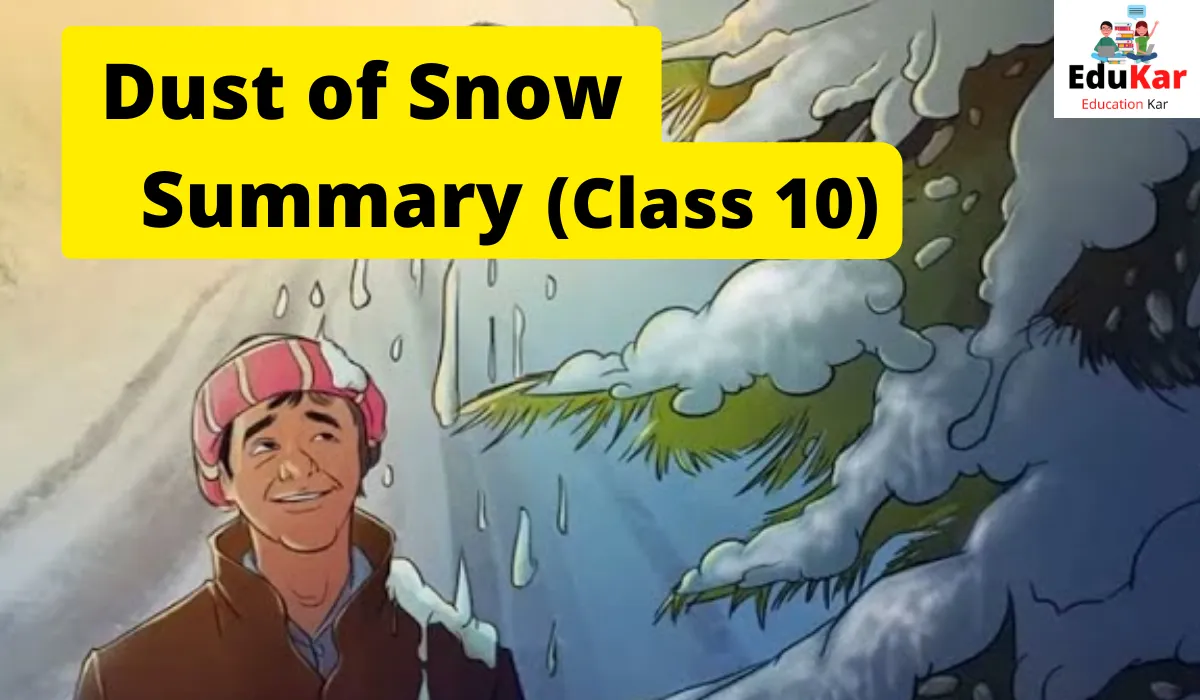
| Name | Dust Of Snow |
| Type | Summary |
| Class | 10 |
| Board | CBSE Board |
| Author | Robert Lee Frost |
Dust of Snow Summary in Edukar.in
For this, edukar.in has created Class 10 English Dust of Snow Summary in order that students can easily understand the meaning of the poem line by line. It’ll become lots easy to grab the context and use it to answer the questions in the exercise. Keeping this summary will facilitate your to organize the chapter well and complete the syllabus perfectly. You’ll be able to use this summary anytime you want to add more convenience to the study schedule.
Summary of Dust of Snow (Class 10)
This article focuses on the short poem, Dust of snow summary by Robert Lee Frost. It demonstrate the extra-ordinary curative power of nature and trivial things in life. Nature cures everything whether it’s awful mood or illness. The author is feeling one such bad day when a crow’s movement near hemlock dusted snow upon him. The snow immediately makes him happier. His day gets lot’s better. The supremacy of nature made him recognize his problems are petty. The very fact that hemlock is poisonously combined with crow being the indicator of doom and fear is used within the poem because the carrier of happiness within the lifetime of the narrator is ironical. The poet tries to highlight that sometimes creatures link with negative side of life often bring change and happiness. Being outside in nature, with all its unpredictability can profit anyone, anywhere at any time.
‘Dust of Snow’ Summary in English
It is winter season and the poet is not in a good mood and was sitting quietly under the hemlock tree covered all over the snow. On spur of short time, a crow sedentary on the branch of the tree shakes the tree, and the snow from tree drop down on the poet. The snow is cold and velvety to the touch which changes the poet’s mood from bitter to elate. This fills him with a invigorating feeling. This moment was very enthralling and saves his day from disappointment. The black crow usually represent bad omen and emblem of death and fear. Since the crow isn’t associated with goodwill, it’s ironic that in this poem he did an honest deed by shaking off the snow.
Robert Frost failed to choose to use any other trees like oak, maple or pine. He chose the hemlock which is often associated with poison and toxicity. Similarly, he uses dust which is useless to anybody and no-one wants to be liking dust. But the poet uses it as an urge that brings positive thoughts in mind. Anyway, the alluring snow that embellish the poisonous hemlock tree’s branches is shaken off by a scary crow. We’ve got toxic hemlock covered in pure, white snow, and someone who is depressed, progressing to kill himself and walking under the tree. The black crow hurl the snow on the poet. The feels of pure cold snow change his mind about sacrificing his life. On the contrary, he decides fail to think of the regrets of his life and sorrow to follow the trail of healing of the inner soul.
This poem conveys the message that nothing in life is tiny. Even insignificant things can bring positive changes in our life. Additionally to the current it also shows that if we take things positively in life situations do change for good. Even the tiny help or good gestures we do for others make large differences. Just believe those random acts of kindness we do and also the way they brighten a person’s day, and sometimes change their future. Noticing and appreciating all the little things in life will make our life happier.
About The Poet: ‘The Dust Of Snow’
Robert Lee Frost was an American poet who was known for his poems and literary pieces set in rural in real world and background.
He wrote again and again about rural life in New England he published his first poems during his high-school days.
Through this poem, the dust of snow he tries to precise that several times one moment is necessary to brighten up your mood and the whole day.
Conclusion of Dust of Snow
The poem teaches us a lesson that each small act in life can illuminate our soul and motivate us to try and do better.
